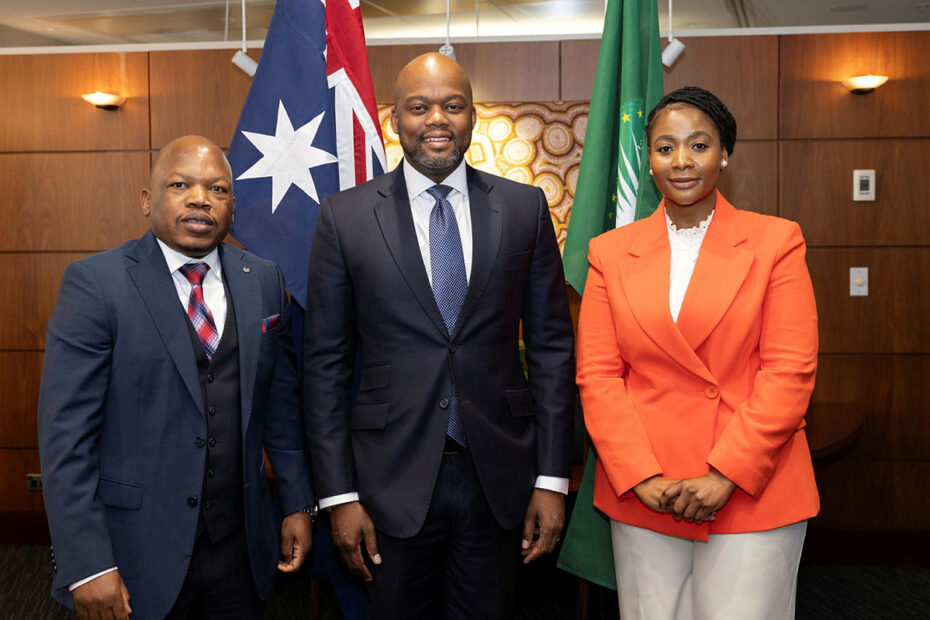The Secretary General of the African Continental Free Trade Area (AfCFTA), Mr Wamkele Mene, paid an official visit to Australia to engage in dialogue with pivotal Australian Institutions in order to set the stage for the upcoming Africa- Australia Summit
During his visit to Australia, Wamkele was joined by esteemed members of the African Diplomatic Corps from Algeria, Botswana, Egypt, Ghana, Kenya, Mauritius, Zambia, South Africa, Sudan, and Nigeria at a reception led by Ms. Lara Nassau of Department of Foreign Affairs and Trade in Australia.
The purpose of the reception was to engage in dialogues with pivotal Australian institutions and to set the stage for the upcoming Africa-Australia Summit.
Discussions with the Dept. of Foreign Affairs, Hon. Don Farrell, and key financial entities like Export Finance Australia & Macquarie Group spotlighted trade & investment opportunities for African SMEs.
Also Read: AfCFTA Talks Dominate as Rwanda Hosts Golden Business Forum
Similarly, the SG held discussions with the Sydney Marine Science Institute where he underscored the potential of the Blue Economy for African island states.
At the same time, Wamkele emphasized the aspiration for concrete deals and impactful outcomes from the landmark gathering.
Challenges in Africa
The Secretary General also emphasized the need to establish and enhance trade links in Africa especially countries with bigger economies that have commensurate responsibilities to import and open their markets
“Our mandate is continental and that’s is how we make sure the trade links between ECOWAS and the EAC are established and enhanced,” Wamkele stated.
He further expressed concerns in numerous Coup de tat experienced in Africa and how it affects trade within the region.
“We know that data is very clear, Military regimes, Juntas don’t have the interest of advancing development,” he noted
More over, he also stated that from the point of view of trade, the coup d’état has severe effects on informal traders and Small Enterprise traders that want to trade across borders
“When the country falls under a military dictatorship, that country correctly is subject to sanction,” Wamkele stated.
The Secretary General also underscored the importance of implementing AfCFTA to promote trade by considering importing goods rather than exporting for instance in Agricultural product’s that can improved food security.
During the discussion, Wamkele called on African governments to take lead and ensure government agencies can make capital available for businesses and private Sectors that seek to expand.
About AfCFTA
The African Continental Free Trade Area (AfCFTA) is one of the flagship projects of the African Union (AU) Agenda 2063: The Africa We Want.
The AfCFTA entered into force on May 30, 2019, after 24 Member States deposited their Instruments of Ratification following a series of continuous continental engagements spanning since 2012.
It was launched at the 12th Extraordinary Session of the AU Assembly of Heads of State and Government in Niamey, Niger, in July 2019. The commencement of trading under the AfCFTA was in January 1, 2021.
The AfCFTA is the world’s largest free trade area bringing together the 55 countries of the African Union (AU) and eight (8) Regional Economic Communities (RECs) to create a single market for the continent.
As part of its mandate, the AfCFTA helps to eliminate trade barriers and boost intra-Africa trade. In particular, it is to advance trade in value-added production across all service sectors of the African Economy.
The AfCFTA contributes to establishing regional value chains in Africa, enabling investment and job creation. The practical implementation of the AfCFTA has the potential to foster industrialization, job creation, and investment, thus enhancing the competitiveness of Africa in the medium to long term.

